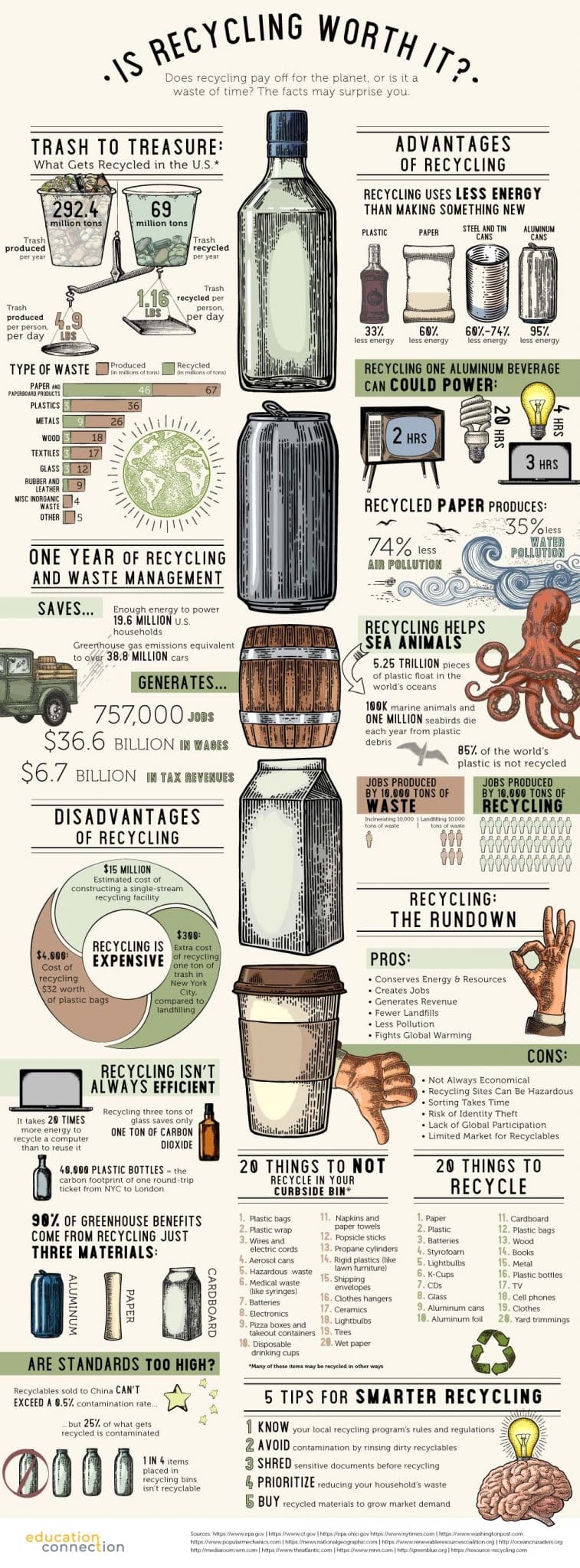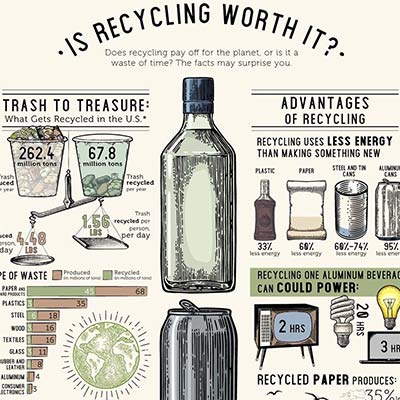Do These Facts Suggest Recycling is a Waste of Time?
Plus, Jobs and Degrees That Have a Positive Impact on the Planet
Table of Contents
Does recycling pay off for the planet, or is it a waste of time? The facts may surprise you.

Want to use this infographic on your site? Just use the code below!
Is Recycling Worth It?
Did you know that that in the U.S., the total generation of municipal solid waste (MSW) in 2018 reached an astounding 292.4 million tons? This translates to approximately 4.9 pounds of waste generated per person per day.
YIKES!
On the flip side, only around 69 million tons were recycled, and a mere 25 million tons were composted. In total, approximately 94 million tons of municipal solid waste (MSW) were recycled and composted, resulting in a recycling and composting rate of 32.1 percent. This significant disparity between the amount of garbage we dispose of compared to what we recycle raises the question of why the balance is so skewed.
Advantages of Recycling
Recycling presents numerous compelling reasons to choose it over discarding items. One key benefit is that recycling requires less energy compared to manufacturing new products. For instance, recycling plastic utilizes two-thirds less energy, while paper uses 60% less energy. When it comes to steel and tin cans, recycling saves between 60 and 74 percent of the energy used to produce them from raw materials. Moreover, recycling a single aluminum beverage can conserves enough energy to power a 14-watt CFL bulb (equivalent to a 60-watt incandescent) for 20 hours, a computer for 3 hours, or a TV for 2 hours.
Great right? Well There is more.
By producing recycled paper, we effectively cut down air pollution by an impressive 74%, along with a notable reduction of 35% in water pollution compared to the production of virgin paper. This conservation of energy holds great potential as it can be harnessed for a multitude of other purposes.
Moreover, the process of generating recycled paper not only exemplifies its environmental benefits but also highlights its significant advantages. It leads to a substantial 74% decrease in air pollution and a commendable 35% reduction in water pollution when contrasted with the production of paper from virgin sources. To further underscore the importance of recycling, consider the remarkable impact of recycling one ton of steel: it slashes air pollution by an astounding 86%, reduces water pollution by an impressive 76%, while concurrently saving an impressive 74% of energy and an essential 40% of water that would have otherwise been consumed.
Shifting our focus, let’s consider the example of recycling just one aluminum can. This seemingly small act holds immense potential, as it has the capability to power:
- A TV for two hours
- A computer for three hours
- A 100 watt light bulb for 4 hours
- A 14 watt CFL light bulb for 20 hours
Ultimately, if an office building with 7,000 employees recycles all its paper, plastic, and corrugated waste annually, it could make a significant impact on reducing greenhouse gas emissions. Specifically, this green initiative could result in a reduction of 1,200 metric tons of carbon equivalent, which is comparable to taking 900 cars off the road for a whole year.
Recycling plays a crucial role not only in conserving energy but also in significantly reducing CO2 emissions. Some opponents of recycling tend to focus on products with low returns, such as plastic and green glass. However, materials like aluminum cans offer a highly positive impact, with recycling saving approximately 95% of the energy required for their initial production due to the energy-intensive nature of manufacturing aluminum.
Statistics from The Balance Small Business reveal that about 69% of the crude steel used in the U.S. in 2019 was sourced from recycled materials, while the EPA estimates that 68% of all paper and cardboard is effectively recycled. These figures indicate that recycling actively reduces the consumption of raw materials and contributes to energy conservation.
The environmental benefits of recycling are evident. By minimizing energy consumption and curbing CO2 emissions, recycling proves to be a more sustainable option. The Waste & Resources Action Programme (WRAP) commissioned analyses from the Technical University of Denmark and the Danish Topic Centre on Waste, which found that recycling was environmentally superior in 83% of the examined scenarios. This highlights the crucial role recycling plays in promoting a greener and more eco-friendly world. (Economist.com – The Truth about recycling)
The Cons of Recycling
Recycling has the potential to generate profits, but it might not always be the most cost-efficient waste management solution. In the United States, landfill space is often more economical compared to the expenses involved in recycling.
When considering the overall cost per ton of waste processing in an average US community, recycling comes out to be approximately $50-$150 more expensive per ton than simply disposing of the waste in a landfill. For financially struggling communities, the monetary benefits from recycling might not be sufficient to offset the disposal costs, leading to everything being dumped in landfills due to the lack of profitability.
Recycling can be costly and sometimes inefficient. For instance, the carbon footprint of recycling 40,000 plastic bottles is equivalent to just one round trip ticket from NYC to London. Similarly, recycling one ton of glass only saves one ton of carbon dioxide.
Recycling is a time-consuming and labor-intensive process aimed at reducing waste; however, it requires the use of valuable resources. According to a report by (NPR), recycling plastic is deemed “costly” and impractical to sort effectively. As stated by Jan Dell, the founder of the Last Beach Cleanup, the US struggles to recycle a mere 5% of its plastic consumption due to the lack of suitable facilities and the high water demands associated with the process. This scarcity of recycling infrastructure discourages further expansion in the US, as reported by (Guardian).
Given water is an increasingly scarce resource, recycling plastic could do more harm to the environment than putting it in a landfill.
Recycling green glass proves to be an unproductive endeavor, yielding a meager outcome. Although green glass can be recycled, it transforms into a rather useless and unattractive substance known as ‘cullet.’ Surprisingly, producing new glass bottles from this recycled material tends to be more expensive than using the primary raw material, sand. Contrary to expectations, disposing of glass in a landfill poses minimal harm as it naturally decomposes into sand over time. Carl Munger highlights an ironic situation in some US cities where citizens are compelled to recycle glass bottles. Despite the intention to recycle, the glass ultimately ends up in the landfill after being transported through recycling trucks to the recycling facility, and then again to the landfill. According to Munger’s perspective in (Cato Unbound), this process effectively leads citizens to pay extra for discarding the glass, merely to maintain the illusion of recycling.
5 Tips for Smarter Recycling
- Familiarize yourself with the rules and regulations of your local recycling program. Knowing what is accepted in your recycling bin will ensure you don’t inadvertently contaminate the recycling process.
- Ensure recyclables are clean by rinsing dirty items before placing them in the recycling bin. Clean recyclables are more likely to be accepted and processed effectively.
- Shred sensitive documents before recycling to protect your privacy. Identity theft is a serious concern, so taking this extra step adds security to the recycling process.
- Focus on reducing your household waste in the first place to minimize the need for recycling. Reducing waste at the source is an essential step in promoting sustainable practices.
- Support the recycling industry by purchasing products made from recycled materials, which helps create a demand for recycling. By buying products made from recycled materials, you contribute to creating a demand for recycling, thus encouraging more sustainable production practices.
Jobs/Degrees That Have a Positive Impact on the Planet
Degrees in:
- Sustainability
- Environmental Science
- Environmental Engineering
- Forestry or Natural Resources
- Agriculture and the Environment
Careers:
- Environmental Scientist or Specialist
Median annual salary, 2022: $76,480 - Environmental Engineer
Median annual salary, 2022: $96,530 - Conservation Scientist
Median annual salary, 2022: $64,460 - Agricultural or Food Scientist
Median annual salary, 2022: $74,940
Financial Aid Info
- Your Guide to Federal Student Loans
- Grants and Scholarships
- Military Benefits
- Private Student Loans
- Repaying Student Loans
- Student Loan Consolidation
- Education Tax Credits | AOTC & LLC
- 15 Military Scholarships to Apply For in 2023
- Grad School Scholarships
- 12 Graduate Scholarships for DACA Students in 2023
- Graduate Scholarships for International Students
- Grants for Women
- Guide Schools & Scholarships for Students with Disabilities
- Guide Tribal Colleges and Scholarships for Native Americans
- 8 Adult Scholarships for Adults Returning to School
- How to Earn Credit for College with Life Experience
- The Psychology of Lying
- 36 Companies That Pay For College
- FAFSA: Parent and Student Assets
- How Do You Get Student Loans Without a Job?

